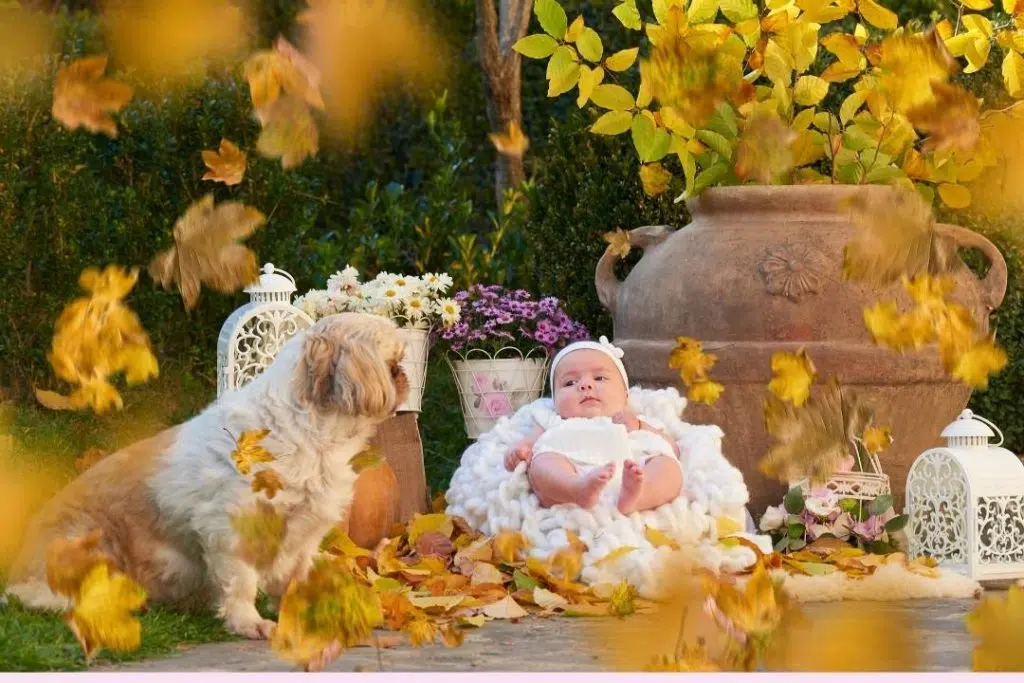Romania is renowned for breathtaking landscapes and strong, but also beautiful women (Nadia Comaneci anyone?!). They’re both unforgettable, the former because it gives a feeling of reaching Paradise, the latter because of how melodic Romanian female names sound.
This harmonic effect is due to a linguistic trait borrowed from Slavic languages, which adds “-a” as ending to the surname. But the convention was not adopted entirely like that in Romania, as surnames had a fixed form. So this suffix was moved to first names instead, thus leading to the creation of wonderful names like Andreea, Ileana, Miruna…
The more recent trend in Romania has been for parents to look at both traditional and international names. Some parents are actually putting effort into specifically finding ones that don’t end in “-a”, as shown by Google trends searches. But plenty parents are still opting to give their babies some beautiful and traditional Romanian names.
Back in the Middle Ages, there was a practice of using two baptism names in Europe. It was believed that children who were given names of saints would be better protected and at the same time show them as members of a Christian family.
Over time, parents began to name their children after the most significant family members or the closest relatives, such as a warrior grandfather or an aunt who was also godmother. The name of the paternal grandmother, who was seen as a matron in the family, could also be used.
At times, parents or godparents had a difficult task in choosing a single name. This problem was solved with the children receiving a saint’s name or one customary within the family. The tradition is still preserved, as many Romanians carry a saintly name. It represents an occasion of celebration and an extra party over the year. Nowadays, the second name is modern, unique, or unusual.
How to Choose a Second Baptismal Name
By tradition and out of respect for the dearest relatives, often the second baptismal name of the child is the name of a grandmother or a grandfather. This brings hope that the spirit and name of the elder will be a guardian angel for the newborn.
Also, by the newer tradition, the second baptismal name may be that of the godfather or godmother, someone who is loved and appreciated by the parents and becomes the spiritual father/mother to the offspring. The name of the godparent is chosen with the intention that in time they will become a role model for the child.
On occasion, the second name of the baby can be one that is dear to the mother, the name of a prominent personality, or a person who played an important role in the life of one of the parents. Not necessarily a relative. In this case, it’s picked because the person had a deep influence or as a sign of gratitude.
Popular Female Baby Names
According to local authorities and dedicated websites, in 2022, as in 2021, the names selected by families for their babies reflected positive connotations or belonged to strong historical or mythological personalities. These were the most popular female baby names in 2022 and 2021.

Anastasia
At the turn of the 20th century, the entire world was gripped by shocking headlines concerning the fate of the Russian royal family and their eventual demise at the hands of revolutionary forces. But even more mysterious were the surrounding theories regarding Anastasia Romanov, youngest daughter to the Emperor, presumed alive by some. With each claim, the legend grew, and while the search for the truth never truly ended, public attention steadily diminished. When it seemed the tale would be completely forgotten, Disney stoked the fires once more, with their production of Anastasia. It immediately became a classic and rekindled not only interest in the princesses’ destiny, but also her name.
The reason it became such a fashionable name for girls in 2023 can be found in its meaning. From the Greek word “anastasis” which translates to “resurrection”, this only added to the myth of enigmatic Anastasia. It is a very popular choice in Eastern Europe, especially in Russian-speaking countries. Many Greek girls received this name, especially those born around Christmas or Easter. In the Orthodox Christian calendar, the Holy Great Martyr Anastasia is celebrated on December 22.
Andreea
One of the most popular names in Romanian onomastics, Andreea remains at the top in 2023. No wonder, as it signifies strength and courage. Slight variations include Andrea and Andreia, which are common in other countries as well. In the Orthodox Christian calendar, St. Andrew the Apostle is celebrated on November 30.
Cristina
Cristina is the Romanian version of Christine/Kristina and it’s a very popular name in Romania. Its origins are Latin and it means “follower of the Christ”. Shortened version of Cris (or Chris) and Tina are also frequent.
Cristina used to be a hugely popular baby name in the 70s and 80s and its popularity as now rising again, in great part due to the Romanian handball superstar Cristina Neagu. She has won multiple EHF and IHF Player of the Year awards and she’s considered one of the best handball players of all times.
Daniela
Daniela is a name of Hebrew origin, translating to “God is my judge”, and connotes a strong and independent woman. As with many Biblical names, it has been quite popular throughout the years. It’s adaptable, can have several shortenings (Dani, Ela) and sounds great in any cultural setting.
Doina
Literally meaning a type of Romanian folk song expressing different deep emotions – sadness, yearning, loss, melancholy, but also love for nature or towards a (lost or far away) partner. While it has decreased in popularity over the last few decades, parents looking to reconnect with old traditions are bringing this name back.
Elena
Mythological name associated with beauty. Helen of Troy, daughter of Zeus, inspired countless artists throughout the centuries and remained a popular name choice around the world. Etymological debates are still happening, though every theory seems to revolve around a similar theme – light.
Indo-European cultures highlight a link with the Sun, like the Greek “Helios”, others prefer a Sanskrit alternative, from svaraṇā meaning “the shining one”, or a separate astral connection to the Moon or planet Venus, from (Ἑλένη Selene).
Romanians honour St. Elena on 21 May, alongside St. Constantin.
Felicia
The name Felicia is the female variant of Felix, which translates to “happy”. It came to be from the Latin “felicis”. The Orthodox Church honors the memory of several saints named Felix, including the Holy Martyr Felix, who was a priest. St. Felix’s Day is on October 19.

Gabriela
Three times World Champion, Gold, Silver and Bronze Olympic medalist, only to name a few of her incredible results, Gabriela Szabo is one of Romania’s most accomplished athletes. Even after retiring, she continues to inspire excellence, and it’s no wonder since her name translates to “God is my strength”. Romanians revere her, so parents choose this name hoping their children will achieve at least part of her success.
Iulia
Iulia, the female counterpart of Iulian, has its basis in the name Julius of Latin origin. At first, it was used as a surname during the Roman Empire, and historians believe that the source was a Greek word “ioulos”, meaning “downed”. Another explanation of the name is “light of heaven”, due to the word “Iovis” in classical Latin.
Ileana
Ileana is a Romanian derivate from of the first name Elena, taken from the Greek (Ἑλένη, with Latin characters Elene, Helene), and means “the solar one”, “the brilliant one”, “the luminous one” (from Helios). Another explanation for the etymology of Ileana is the derivation from the Hebrew word “Eliyahu” as in “Yahweh is God”. Also from Hebrew, it could translate as “the Lord’s answer”. Ileana Cosânzeana is the main female character in Romanian mythological fairy tales, the counterpart of Făt-Frumos, usually his feminine ideal.
Lucia
From the Latin name Lucius, we get Lucia for women and Lucian for men. They share a root in the word “lux”, translated as “light”. Both are popular in Italy, Spain, Portugal, Germany, England, Sweden, Norway, Denmark, Romania, Latvia, and Slovakia. Saint Lucia is celebrated by the Orthodox Church on December 13.
Lelia
Again, from Latin comes Lelia. It translates as “good”, “correct”, and is a variant of the name Eulalia, a composite of two Greek words: “I” which means “good”, “correct”, and “lalein”, which means “to speak”.
Maria
Maria is one of the oldest and most prevailing names in Romania. Spread by the Roman Empire through Christianity, though it existed even before that, it holds several connotations, from “rebellion” to “beloved child”. Romanian are deeply religious people and throughout the year, there are several celebrations dedicated to Sf. Maria.
Maria was the name of Romania’s second queen, as well as the name of countless local celebrities. There are many variations across the world, but two unique forms are only specific to Romania: Marioara and Mioara.
Miruna
The name Miruna may have its origin in the old Slavic word “miru” which translates as “peace”. It is found almost exclusively in Romania. Some linguists believe that it’s the feminine of Miron, from the Greek “Myron”, through the noun “myron” – an oil extracted from fragrant plants. In Christian faith, this balm is part of the phrase “sanctified oil”, the Romanian “mir”, used in the Sacrament of Baptism.
Monica
Stepping away from European influences, the name Monica is most likely of North African or Phoenician origin. The first references are made in ancient inscriptions of Numibia, a Berber kingdom in North Africa. Historians believe it may have something to do with a deity from Lebanon, Mon, who is descended from the god Amun of the Egyptians. Saint Monica of Africa, the mother of Blessed Augustine, was born in the year 322 and passed away in the summer of 378, at the age of only 56. She is the protector of wives and mothers whose men or children live far from God, wandering in the wrong ways. She is celebrated on May 4.
Nadia
Nadia is the diminutive of the Russian name Nadezhda, which translates as “hope”. The Arab world has a similar name, Nadiyyah, meaning “delicate”. It gained much popularity in Romania during the late 1970s with the remarkable performances of gymnast Nadia Comaneci.
Nicoleta
Nicoleta is a Romanian name, derived from Greek, meaning “people of victory”. Countless variations exist in other countries such as Nicoletta in Italian, Nicolette in French, though it’s unique in this form to Romania.
Nicoleta has a male counterpart in Nicolae, which is another well-known Christian saint and a traditional Romanian male name. Sleek, stately and lending itself to nicknames, like Nico, Nikki, this could be a wonderful choice for a young girl.
Otilia
The name Otilia is derived from the Germanic element “odal” used for “homeland” or “hear” as in “wealth”. Saint Odilia (or Odila) was an eighth-century nun, considered the patron saint of Alsace. She may have been born blind, but received sight after being baptized into the Christian religion. The Orthodox Church celebrates her on December 13.
Ofelia
This name was probably created in this form by the fifteenth-century poet Jacopo Sannazaro for a character in his poem Arcadia. Later, it was “borrowed” by William Shakespeare for his play “Hamlet” (around 1600). Ophelia is Hamlet’s lover, who unfortunately is consumed by love and grief, goes insane drowns. Despite this, the name is used only from the XIX century and claims as origin the Greek word “ophelos”, meaning “help”, “advantage”.
Roxana
Wife to Alexandre the Great, going back to around the year 300 B.C. It comes from Old Persian “rauxšnā” meaning “bright, shining” . Quite popular around the globe thanks to the many variations in can take, “Roxanne” in English and French, “Rossana” in Italian, “Roksana” in Slavic countries etc. In Romanian, it may be heard under another form, Ruxandra.
Simona
If you’re looking for a name that stands for hard work and success, then look no further. Top Romanian tennis player Simona Halep seems to disregard the connotations of the name, “to listen” (from Old Hebrew), and decided to do a lot of talking on the courts, winning Grand Slam tournaments both on clay and grass.
This is an uncommon name outside of Romania, so it makes for a unique choice.
Stela
From the Greek word “stylos” translated as “pillar” come the name Stela and its male analogue Stelian. However, in the Romanian language, it may be a derivate of the word “star”. Saint Stelian the Paphlagon, the protector of infants and the Christian family, is celebrated on November 26. Saint Stelian was born around the sixth century, in Adrianopolis, within the province of Paphlagonia, Asia Minor (on the territory of present-day Turkey), in a very wealthy family.
Teodora
Theodora is the feminine form of the name Theodore, from the Greek name “Theodoros”, which translates to “the gift of God” or the combination of Greek words “theos” which means “God” and “doron” meaning “gift”. Saint Theodore Tiron is commemorated by the Orthodox Church on February 17.

Romanians have always had a strong connection to nature, so names of flowers are sometimes given to children. Among the more popular ones are Camelia (Camellia), Brandusa (Saffron), and Crina meaning Lily.
If you still need more choices, we got you covered. Here’s our extended list of Romanian female names. Enjoy!
- Adelina
- Adina
- Adriana
- Adela
- Agnes
- Alina
- Alexandra
- Ana
- Anastasia
- Anisoara
- Ana-Maria
- Anca
- Angelica
- Andreea
- Andra
- Antonia
- Aurora
- Aura
- Aurelia
- Bogdana
- Brandusa
- Bianca
- Camelia
- Carina
- Cezara
- Cecilia
- Crina
- Cosmina
- Codruta
- Clara
- Carmen
- Catalina
- Carla
- Cristina/Cristiana
- Claudia
- Corina
- Daciana
- Doina
- Dorina
- Dalia
- Dana
- Daniela
- Daria
- Delia
- Diana
- Ecaterina
- Elena
- Elisabeta
- Eliza
- Emilia
- Ema
- Florentina
- Felicia
- Gabriela
- Geanina
- Georgiana
- Gloria
- Gratiela
- Gina
- Greta
- Ilinca
- Ioana
- Irina
- Iulia
- Izabela
- Iris
- Lacramioara
- Laura
- Lavinia
- Larisa
- Letitia
- Liliana
- Lidia
- Luiza
- Lucia
- Luminita
- Madalina
- Mara
- Marcela
- Maria
- Mariana
- Melania
- Mihaela
- Mirela
- Mirabela
- Monica
- Mioara
- Nadia
- Narcisa
- Nicoleta
- Nina
- Natasa
- Oana
- Ozana
- Otilia
- Olimpia
- Olivia
- Paula
- Raluca
- Ramona
- Rodica
- Romanita
- Roxana
- Ruxandra
- Sabina
- Silvia
- Simona
- Sofia
- Sonia
- Stela
- Sorina
- Sorana
- Stefania
- Selena
- Selina
- Simina
- Tatiana
- Tereza
- Teodora
- Tamara
- Tania
- Valentina
- Violeta
- Victoria
- Viorela
- Virginia
- Viviana
- Zoe


